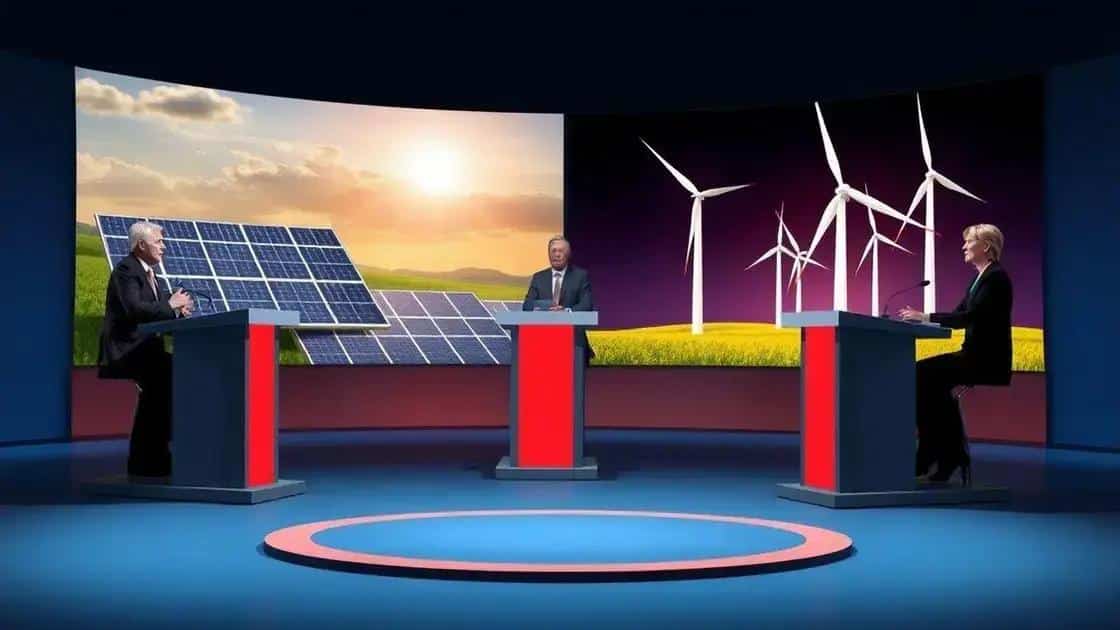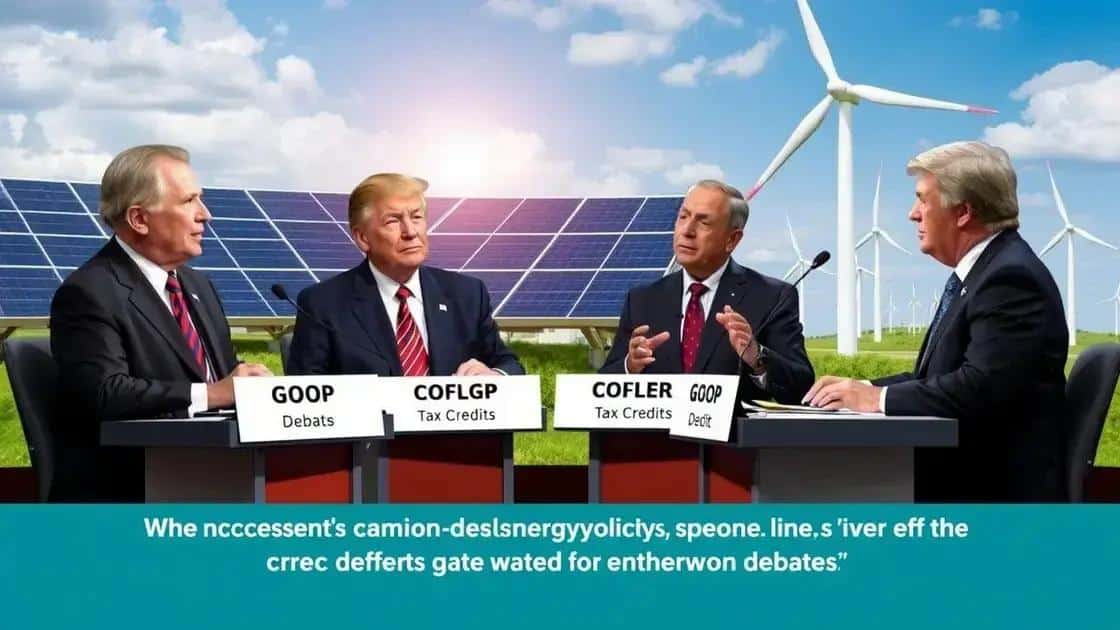IRA energy tax credit debate GOP raises key questions

The IRA energy tax credit debate within the GOP centers on balancing financial incentives for renewable energy with concerns about government intervention and market competition.
The IRA energy tax credit debate GOP has sparked significant discussions recently, as party members assess its implications. Have you considered how this affects our approach to energy solutions?
Overview of the IRA energy tax credits
The IRA energy tax credits play a crucial role in shaping our energy landscape today. Understanding what these credits entail is essential for both individuals and businesses.
What Are IRA Energy Tax Credits?
IRA energy tax credits refer to financial incentives established under the Inflation Reduction Act. These credits aim to promote the use of renewable energy and enhance energy efficiency across various sectors. The program encourages innovation and investment in green technologies, making energy transition more accessible.
Key Features of the Credits
- Wide Range of Applications: The credits apply to solar, wind, and other renewable energy projects.
- Investment Boost: They significantly reduce upfront costs, encouraging investments in energy efficiency.
- Long-Term Benefits: Users can enjoy savings on their energy bills while contributing to a sustainable future.
These credits not only help reduce the financial burden but also promote significant environmental benefits. By investing in renewable energy, both residential and commercial entities can play a part in mitigating climate change. This dual benefit is critical as more people and businesses consider their carbon footprint.
It’s essential to note the terms and conditions attached to these credits might vary. Therefore, staying informed can help potential beneficiaries take full advantage of these opportunities.
In summary, the IRA energy tax credits serve as a powerful tool to catalyze the transition towards renewable energy. They lower costs while boosting investment in sustainable technologies that benefit both the economy and the environment. Understanding these incentives is vital for anyone looking to make more informed energy decisions.
GOP perspectives on energy tax credits

Different members of the GOP have a variety of perspectives on energy tax credits, showcasing a spectrum of opinions that reflect broader concerns. Understanding these views is important for grasping the political landscape surrounding energy policy.
Support for Energy Tax Credits
Some GOP members support energy tax credits as a means to promote innovation in renewable energy sectors. They believe these incentives can drive economic growth and create jobs. Emphasizing energy independence, supporters argue that boosting renewables can reduce the country’s reliance on foreign oil.
Concerns About Big Government
On the other hand, there are concerns about government intervention in the market. Critics within the GOP often argue that energy tax credits can lead to a dependence on federal support and may not align with free-market principles. They worry that these credits favor specific industries and could distort market competition.
- Free Market Focus: Some GOP leaders advocate for minimal government involvement in energy sectors.
- Targeting Specific Industries: Critics highlight that tax credits could unfairly benefit certain renewable projects over others.
- Long-Term Costs: Concerns about the long-term fiscal impact on taxpayers are prevalent.
An essential part of the discussion focuses on the balance between fostering innovation and ensuring fair competition. For some, energy tax credits represent a necessary step towards a sustainable future, while for others, they pose risks to the principles of economic freedom.
It’s vital for stakeholders to understand these differing viewpoints. Engaging in dialogue about the role of the government in the energy sector can lead to a more informed decision-making process that reflects the interests of all citizens.
Impact on renewable energy initiatives
The impact on renewable energy initiatives driven by tax credits is significant and multifaceted. These credits can stimulate investment in technologies that harness clean energy, thus facilitating a shift towards greener solutions.
Boosting Investment in Renewables
By offering financial incentives, tax credits encourage companies to invest in renewable energy sources like solar, wind, and hydroelectric power. This investment not only leads to the development of new projects but also supports existing ones. As more businesses join the push for renewables, the overall capacity for clean energy generation increases.
Job Creation and Economic Growth
As initiatives in renewable energy expand, job creation follows. The demand for skilled workers in fields such as installation, maintenance, and technology development grows. With more jobs available, local economies can see a positive boost.
- Skilled Workforce Development: Training programs and educational institutions begin to focus on renewable energy skills.
- Economic Resilience: Areas that adopt renewable projects experience diversified job opportunities.
- Rural Community Benefits: Often, renewable projects are located in rural areas, providing much-needed jobs and stability.
In addition to job creation, renewable energy initiatives contribute to energy security and independence. As reliance on fossil fuels decreases, communities can harness local resources for energy needs. This not only reduces costs but also ensures greater resilience against global energy fluctuations.
The interplay between tax credits and renewable energy initiatives illustrates a vital relationship. These credits encourage innovation, partnerships, and a collective effort toward a sustainable future.
Future implications for energy policies

The future implications for energy policies are a pressing topic as the energy landscape evolves. Ongoing discussions about energy tax credits will likely shape how policies are crafted in the coming years. Stakeholders must consider both current trends and future demands when drafting new legislation.
Shifting Towards Sustainability
As awareness of climate change grows, future energy policies will likely prioritize sustainability. There is a clear trend toward integrating more renewable energy sources into the national grid. This shift influences the design of financial incentives, which aim to boost green technologies and encourage utility companies to explore cleaner options.
Technological Advancements and Innovation
Advances in technology will continue to change the energy sector. Policies will need to adapt to support emerging innovations that can enhance energy efficiency. The incorporation of smart grids and energy storage solutions will require new regulatory frameworks.
- Emphasis on Future Technologies: Energy policies will start focusing on supporting breakthrough technologies that can change how we produce and consume energy.
- Integration of Diverse Energy Sources: Solutions may include diverse energy systems that allow for various sources to work together efficiently.
- Investment in Research and Development: Ongoing funding for research will be essential to facilitate continuous improvement in energy solutions.
Moreover, the collaborative efforts among government entities, businesses, and communities will dictate the success of future energy policies. Engaging all stakeholders in discussions will be crucial. This collaboration ensures that energy policies not only promote growth but are also socially equitable and environmentally sound.
Understanding these implications is vital for lawmakers and businesses alike. As decisions are made today, they will have lasting effects on our energy future, influencing how society addresses energy demands and environmental challenges moving forward.
FAQ – Frequently Asked Questions about IRA Energy Tax Credits and GOP Perspectives
What are IRA energy tax credits?
IRA energy tax credits are financial incentives designed to encourage the use of renewable energy sources and improve energy efficiency.
How do these tax credits impact renewable energy initiatives?
These credits stimulate investment in renewable projects, promote job creation, and support economic growth in green technologies.
What concerns does the GOP have regarding energy tax credits?
Some GOP members worry that energy tax credits may lead to government overreach and distort free market principles.
What are the future implications of current energy policies?
Future energy policies are likely to prioritize sustainability, technological advancements, and collaborative efforts among stakeholders for effective energy solutions.






